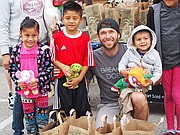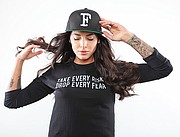For Better, Not Worse: Apparel With a Purpose
Apparel With a Purpose
As of Thursday, May 19, 2016
With every For Better, Not Worse (FBNW) shirt sold, a bag of groceries goes to a child in need.
“My two main goals are to make an impact on kids’ lives and [encourage] other companies to see how they can make a profitable business while giving back to the community,” said FBNW founder Patricc Reed, who started the Los Angeles–based company after leaving his previous position as operations director and partner of Groceries Apparel.
FBNW is made in Los Angeles using locally sourced materials. Constructed from jersey knit, tri-blends and cotton, the collection consists of basic graphic tees, tanks, hoodies and sweatshirts that come in black, white, heather gray and sand colorways. Each piece has a positive message, a phrase or affirmation embossed across the front.
After leaving Groceries, Reed was looking to launch a business with a philanthropic mission.
After speaking with an administrator in the Pasadena Unified School District, Reed learned that while there are programs to provide children with school lunches or classroom supplies, many kids lack sufficient food at home to eat over the weekends, holidays and summer, especially.
FBNW teamed up with the Pasadena Unified School District and a sub department called Families in Transition (FIT), which provides outreach, services and assistance to families in need.
“Every public school in that district except one is a ‘title one,’ which classifies them as low income,” Reed said, adding that he’s expanding the program to include Los Angeles County schools as well.
Reed works with FIT to identify families in need, and food drops are arranged approximately two weeks before the drop date.
“I look at my sales records for the number of shirts sold since the previous drop. I then give that number to Families in Transition.”
FBNW held its first food drop on March 5, when Reed and a team of volunteers distributed 212 bags of groceries. Reed did all the shopping. Each bag included oatmeal, a can of vegetables, a pack of crackers, soup, ramen noodles and a granola bar.
“In our first food drive, we were lucky enough to get Whole Foods to [participate],” Reed said. “They loved the idea so they donated an additional item to put in our bag as well as the bag itself. Next month we are going to host a pop-up in the Pasadena Whole Foods store, which happens to fit our demographic. That’s part of my goal. I want companies to see what we are doing so they contribute as well.”
Reed plans to start by distributing food four times annually with plans to increase the number of food drops as the company grows. Eventually, he hopes to be distributing thousands of bags of food weekly across multiple cities nationwide.
FBNW is planning to distribute more than 550 bags at the next food drop on June 4.
“We still have a couple more weeks to increase that number. [However,] I’m happy with where we are for the June drop thus far,” Reed said.
FBNW exhibited at its first trade show, the consumer marketplace Unique LA, held recently at the California Market Center in Los Angeles.
“I started looking at trade shows, and I was into their [direct-to-sell platform]. I figured we should attend and try to sell to reach our June goal [of more than 750 bags],” Reed said.
Reed also opened up sales to wholesale accounts, landing orders from Sodo and Dungarees. Wholesale price points range from $17.50 to $20.50.
The next step is to create a new website for FBNW, which Reed—the company’s only employee—expects to be live in a few months.
“At the end of the day, it’s not solely about the product or the brand but how that distribution makes an impact,” Reed said. “So far, the response has been amazing.”
For more information, visit www.fbnw.us.


